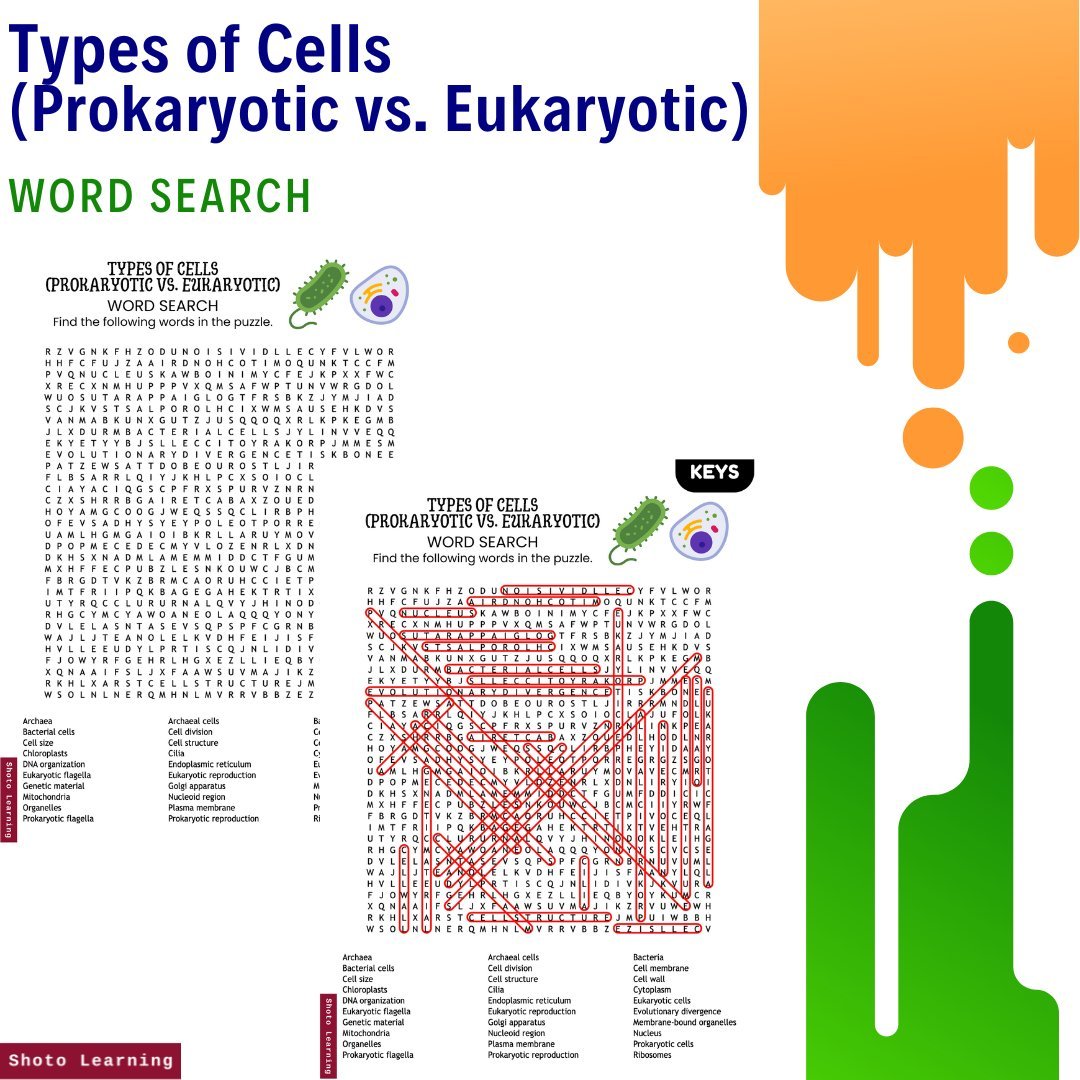 Image 1 of 5
Image 1 of 5

 Image 2 of 5
Image 2 of 5

 Image 3 of 5
Image 3 of 5

 Image 4 of 5
Image 4 of 5

 Image 5 of 5
Image 5 of 5






Cellular Clash: Prokaryotic vs. Eukaryotic Debate Worksheet Set
Engage your students in lively discussions about the fascinating world of cellular biology with our "Cellular Clash" debate worksheet set! This comprehensive PDF package features ten thought-provoking debate questions centered around the comparison of prokaryotic and eukaryotic cells, along with detailed answers to facilitate meaningful classroom discussions.
Key Features:
Stimulating Debate Questions: Encourage critical thinking and analysis with ten carefully crafted debate questions exploring various aspects of prokaryotic and eukaryotic cells, sparking engaging discussions among students.
Comprehensive Coverage: Delve into the intricacies of cellular biology by addressing topics such as evolutionary origins, adaptability, energy production, reproduction, and structural differences between prokaryotic and eukaryotic cells.
Detailed Answers Provided: Facilitate productive debates and guide students' understanding with detailed answers included for each debate question, offering valuable insights and supporting evidence to enhance classroom discourse.
Flexible Implementation: Seamlessly integrate these debate worksheets into your lesson plans, whether as standalone activities, discussion starters, or as part of larger units on cell biology, fostering student engagement and participation.
Promotes Critical Thinking: Encourage students to analyze, evaluate, and defend their viewpoints through evidence-based arguments, fostering the development of critical thinking, communication, and reasoning skills.
Ideal for Group Activities: Foster collaboration and teamwork by assigning debate questions to small groups of students, allowing them to research, prepare arguments, and present their findings to their peers.
How to Use the Debate Worksheet:
Choose a Debate Topic: Select a debate topic provided on the worksheet that interests you or aligns with your lesson objectives.
State Your Position: Write down whether you agree or disagree with the chosen topic under "My Position."
List Supporting Points: Identify and note down three points that support your position under "Points that support my position."
Consider Opposing Points: Write three points that oppose your position under "Points that go against my position." This helps in understanding the other side of the argument.
Develop Counterarguments: Use "I could argue that" to think of counterarguments to the opposing points you listed.
Identify Weaknesses: Reflect on "Possible weaknesses in my argument" to anticipate any flaws or gaps in your reasoning.
Review and Practice: Use the provided answers to review possible arguments and practice debating with a partner or group.
Prepare for the Debate: Use your completed worksheet as a guide to structure your arguments and rebuttals for an upcoming debate.
These worksheets help students critically analyze different perspectives and build strong, persuasive arguments.
Empower your students to explore the complexities of cellular biology through stimulating debates with our "Cellular Clash" worksheet set. Encourage critical thinking, foster meaningful discussions, and deepen understanding of prokaryotic and eukaryotic cells in an interactive and engaging format!
Order your copy today!
Engage your students in lively discussions about the fascinating world of cellular biology with our "Cellular Clash" debate worksheet set! This comprehensive PDF package features ten thought-provoking debate questions centered around the comparison of prokaryotic and eukaryotic cells, along with detailed answers to facilitate meaningful classroom discussions.
Key Features:
Stimulating Debate Questions: Encourage critical thinking and analysis with ten carefully crafted debate questions exploring various aspects of prokaryotic and eukaryotic cells, sparking engaging discussions among students.
Comprehensive Coverage: Delve into the intricacies of cellular biology by addressing topics such as evolutionary origins, adaptability, energy production, reproduction, and structural differences between prokaryotic and eukaryotic cells.
Detailed Answers Provided: Facilitate productive debates and guide students' understanding with detailed answers included for each debate question, offering valuable insights and supporting evidence to enhance classroom discourse.
Flexible Implementation: Seamlessly integrate these debate worksheets into your lesson plans, whether as standalone activities, discussion starters, or as part of larger units on cell biology, fostering student engagement and participation.
Promotes Critical Thinking: Encourage students to analyze, evaluate, and defend their viewpoints through evidence-based arguments, fostering the development of critical thinking, communication, and reasoning skills.
Ideal for Group Activities: Foster collaboration and teamwork by assigning debate questions to small groups of students, allowing them to research, prepare arguments, and present their findings to their peers.
How to Use the Debate Worksheet:
Choose a Debate Topic: Select a debate topic provided on the worksheet that interests you or aligns with your lesson objectives.
State Your Position: Write down whether you agree or disagree with the chosen topic under "My Position."
List Supporting Points: Identify and note down three points that support your position under "Points that support my position."
Consider Opposing Points: Write three points that oppose your position under "Points that go against my position." This helps in understanding the other side of the argument.
Develop Counterarguments: Use "I could argue that" to think of counterarguments to the opposing points you listed.
Identify Weaknesses: Reflect on "Possible weaknesses in my argument" to anticipate any flaws or gaps in your reasoning.
Review and Practice: Use the provided answers to review possible arguments and practice debating with a partner or group.
Prepare for the Debate: Use your completed worksheet as a guide to structure your arguments and rebuttals for an upcoming debate.
These worksheets help students critically analyze different perspectives and build strong, persuasive arguments.
Empower your students to explore the complexities of cellular biology through stimulating debates with our "Cellular Clash" worksheet set. Encourage critical thinking, foster meaningful discussions, and deepen understanding of prokaryotic and eukaryotic cells in an interactive and engaging format!
Order your copy today!
Check out our blog for more information - Click Here






























